Populism and division: Latin America at the ballot box
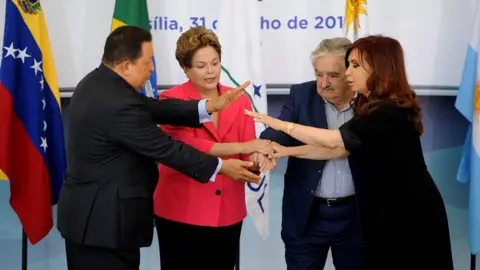 AFP
AFPIt does not seem long ago that analysts were predicting a new chapter in Latin America.
At the start of the 21st Century, the region's politics were entering a new dawn. For many the change was invigorating: a new socialist era in a region long-known for its gaping inequalities.
The poster boys of these new politics were Venezuela's Hugo Chávez and Brazil's Luiz Inacio Lula da Silva. And across Latin America, from Bolivia to Ecuador and Argentina, the left won out.
Happily ever after?
Fast-forward nearly two decades and Lula, who once was Brazil's most popular politician, has been sentenced to 12 years in prison for crimes connected to Operation Car Wash, the largest corruption investigation in the country's history.
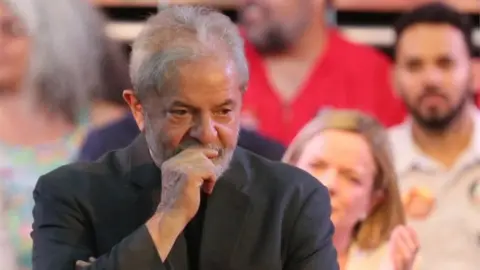 EPA
EPAHugo Chávez's successor, Nicolás Maduro, has run Venezuela into the ground. People are going hungry and more than four in five people in a country with vast oil reserves are living in poverty.

Read more:

When Mauricio Macri won the presidential election in Argentina in 2015, he ended eight years of Peronist rule under Cristina Fernández de Kirchner.
Last year, centre-right candidate Sebastián Piñera won Chile's elections.

Read more:

And in Costa Rica earlier this month, an evangelical preacher won the first round of the presidential election and currently maintains the lead ahead of a second round in April.
Change is afoot.
Electoral marathon
This year, six presidential elections are taking place in the region.

1 April: Costa Rica second round
22 April: Paraguay & Venezuela
27 May: Colombia first round
17 June: Colombia run-off (if required)
1 July: Mexico
7 October: Brazil first round
28 October: Brazil run-off (if required)

Two thirds of the region's more than 600 million inhabitants will have new leader this year and those elected could profoundly change the way Latin America looks and acts.
So are we seeing a marked swing from the left to the right? It is not that simple.
"I think it is very difficult to identify a clear narrative," says Oliver Stuenkel, a professor of International Relations at the Getúlio Vargas Foundation in São Paulo.
"Basically the entire political situation in most countries is in flux with the tendency that established parties will not be able to hold onto power and new parties will come in."
There are however several things that unify the region.
Economy
A decade or so ago, Latin America was riding high on a commodities boom.
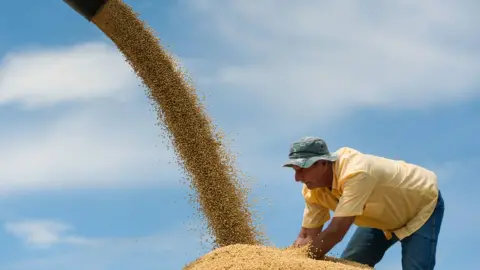 Getty Images
Getty ImagesThat meant that countries like Venezuela, with its vast oil reserves, and Brazil, with its commodities such as soy, sugar, coffee and orange juice, could afford to support its generous social programmes.
The region grew on average around 6% between 2003 and 2008, helping to lift millions of people out of poverty.
It is a different era now. Economic growth has slowed right down.
"Between 70 and 80 million people moved from poverty to the middle class," says Daniel Zovatto, the Director for Latin America and the Caribbean at the Institute for Democracy and Electoral Assistance.
"But it's a very precarious middle class that risks returning to poverty."
With dissatisfaction rising, political allegiances are changing.
Corruption
Corruption is the buzzword of Latin American politics.
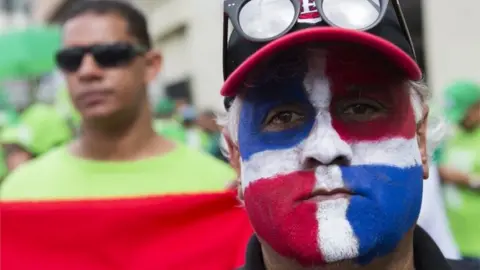 EPA
EPAAccording to Transparency International, more than half of people in the region feel their government is doing badly at fighting corruption.
More than 90 million people said they paid a bribe in 2015. Corruption is not new, but people's attitude to it is changing.
Brazil's Car Wash corruption probe can take some responsibility for that.
It has implicated not just the country's biggest politicians and business leaders but its tentacles have spread right across the region, from Peru and Panama to Venezuela.
So what is different now? Daniel Zovatto likens it to the recent controversy over sexual violence.
"Sexual harassment isn't new either, but look at the impact now," he says. "There's a change in culture, a change in values," he says, adding that with the rise in the middle class, it is not as acceptable as it was before.
Social media
The way people consume politics in the region is also changing.
Latin Americans are some of the biggest users of social media. Brazil has the third-largest numbers of Facebook users in the world.
"Social media is making things quite complicated," says Oliver Stuenkel.
"A lot of people are becoming more isolated from other mainstream debate. You now have less productive dialogue due to extreme polarization, which is quite worrying because it makes more difficult to establish compromises."
Polarisation
That is especially so in places like Brazil where Lula still has millions of followers despite the corruption charges against him.
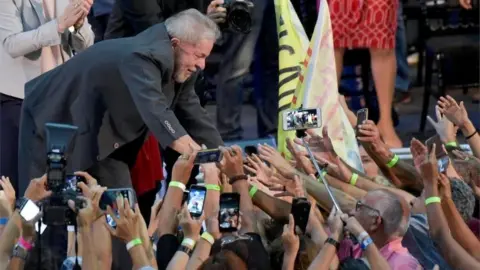 Reuters
ReutersBut on the other side of the political divide, there is a growing anti-Lula movement and increasingly powerful right-wing groups are shouting down the left.
Politics is polarised and that is being echoed across the region.
No more so than in Colombia where President Juan Manuel Santos brokered a peace deal with the Revolutionary Armed Forces of Colombia (Farc) in 2016 after more than 50 years of conflict. The deal divided Colombians.
But beyond the division over the peace process, one thing unites Colombians and that is anger over corruption.
After President Santos had to apologise for illegal funds being funnelled into his campaign, people want change and that will be a big focus of the country's presidential elections in May.
Populism
People want a new kind of leadership.
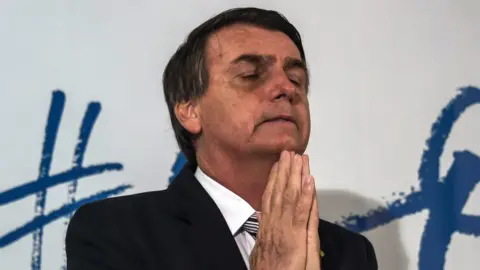 Getty Images
Getty Images"There is a crisis of representative democracy across the globe. You have to be much more attentive to the different forms in which reality exists," says former Brazilian President Fernando Henrique Cardoso.
"You can't put them all together with a simple label. We have to go deeper to understand what's really going on."
In Brazil, Jair Bolsonaro, an extreme right-wing politician, is polling second behind Lula who may not even be able to run because of his criminal record.
A nationalist who supports military intervention in Brazil, Mr Bolsonaro's populist style has drawn a great deal of support from people who feel the country needs strong leadership.
The region's second-biggest economy, Mexico, has a populist candidate of its own but Andrés Manuel López Obrador could not be more different.
While Mr Bolsonaro has been nick-named Brazil's Trump, Mr López Obrador despises the US President and wants to clamp down on crime and corruption.
However, both men clearly show the desire in the region for a new kind of politics and a rejection of the political elite.
Democracy
There is a deep distrust of institutions across the region.
According to polls carried out by Latinobarómetro, just 53% of people in 2017 thought democracy was the best way of governing. That is the fifth consecutive year it has fallen.
Brazilians are the least happy with democracy in the entire region. Just 13% declare themselves satisfied with democracy.
What makes people think these elections will change that? Oliver Stuenkel things the dissatisfaction will give rise to more extreme candidates.
"In many countries you have authoritarian candidates saying that the difficulty of democracy is that it takes a long time to make a decision, that it's necessary to concentrate power," he says, giving the examples of Bolivia, Venezuela and parts of Central America.
Mauricio Fronzaglia, professor of political science at Mackenzie University, agrees.
"Democracy does not deliver what democracy once promised," he says.
Fernando Henrique Cardoso thinks the problem is more nuanced. "We have democracy, we're following laws, following the constitution. What is lacking is legitimacy."
And that cannot be solved in an election.
